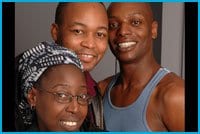If you are someone who has wondered how the morning star came to shine as it does or have questioned the source of blessings in your life, Orphan Boy, the latest offering in the Metamorphosis Festival may be just the thing for you. Opening this Thu, May 26 at Artword Theatre with live music and a cast of six dancers, this is a production that promises to have heart.
Produced by Ensemble Noir, whose mission is to promote cultural diversity in contemporary music, and Dance Immersion, whose mandate is to promote dance artists and choreographers from the African diaspora, this production of Orphan Boy draws on many cultural threads in recounting a traditional Masai tale. Simply told, it is a story of how, when one is blessed by powers beyond our understanding, we are given a sacred trust. If we break that trust, we suffer the consequences.
This imagining of Orphan Boy utilizes music composed by Bongani Ndodana, artistic director of Ensemble Noir and choreography by Germaul Barnes, formerly of Bill T Jones/Arnie Zane Dance Company. Also on the choreographic roster is Vivine Scarlett.
As collaborators, Ndodana and Barnes are no strangers to one another and seem ideally suited to working together. Ten years and four projects under their belts, Barnes describes Ndodana as an artistic brother. It is clear there is mutual respect and easy rapport. Even though there have been challenges (“Come hell or high water,” laughs Ndodana), there is between them a complete trust in the creative aspirations and visions of the other.
Barnes’ nature is outgoing (he complimented Xtra on sending what he felt was an attractive writer for the interview) and energetic. “I remember the first time I saw him,” Ndodana recalls. “It was in Chicago and he was wearing a Jane Austin skirt.” He remembers how, during their first collaboration, he tried to collect his faltering ensemble as they struggled through a piece of his music only to discover the reason for their distraction was a completely nude Barnes having just taken the stage.
Ndodana is quieter but it is clear that this soft-spoken man is committed to his art and purpose. “His music is grounded,” says Barnes. “It has roots.” As to who wears the artistic pants in this couple, and as much as Barnes may have a predilection to taking his real ones off, both are men of tremendous experience, having won many accolades and awards.
Exploring a myth that is African in origin through music and dance certainly falls under the mandate of both Ensemble Noir and Dance Immersion. But it is clear that both gay artists have a personal interest. Ndodana was raised in South Africa and Barnes has been travelling and teaching in Africa for more than 10 years now. The duo have that definite feeling of straddling two cultures.
One thing both men agree upon as typifying the African spirit is its open and inclusive nature. There is an ability to adapt to new ideas, incorporate them and transform them by adding their own experiences and cultural distinctiveness to create something where the sum is greater than its parts. One has only to glance at world contemporary culture to see its African underpinnings.
Barnes notes that shared cultural mores and sensibilities abound among Africans and people of the African diaspora and it is obvious that he enjoys discovering anew something that has been familiar to him for his whole life and, only just now, seeing it in a different light.
Herein lies the beauty and power of myth and cultural diversity – taking advantage of this gift, to see the world and your place in it afresh and to allow for the possibility of transformation is, I think, a sacred trust.

 Why you can trust Xtra
Why you can trust Xtra


